VIRTUOSITY (1995)
When a VR simulation created using the personalities of multiple serial killers escapes into the real world, an ex-cop is tasked with stopping it.

When a VR simulation created using the personalities of multiple serial killers escapes into the real world, an ex-cop is tasked with stopping it.

Denzel Washington is one of the greats. A modern Shakespearean actor who’s delivered performances demanding one’s attention, and it was easy to give because he’s so damn cool. If his character took the situation seriously, then you were pulled in hook, line, and sinker. His purposeful demeanour aided in what every thespian requires in Hollywood; convincing audiences to buy into ridiculous premises to earn box office cash.
From Philadelphia (1993) to The Tragedy of Macbeth (2021), Denzel’s done incredible work, but he also appeared in movies to earn a pay cheque, with a long line of 1990s pulp thrillers including Ricochet (1990), Crimson Tide (1995), Fallen (1998), The Siege (1998), and The Bone Collector (1999). All gravitate towards the word “underrated” off the back of Denzel’s charisma, even if they’re a little silly. Riding the success of Bruce Willis in Die Hard (1988), Denzel did his best to elevate pitches of tough cops in tougher scenarios, like fighting John Lithgow while on drugs, John Goodman possessed by a Jewish demon, or a simple serial killer story but where the cop is a quadriplegic. Denzel Washington was the first to attempt ‘Die Hard in a Bed.’
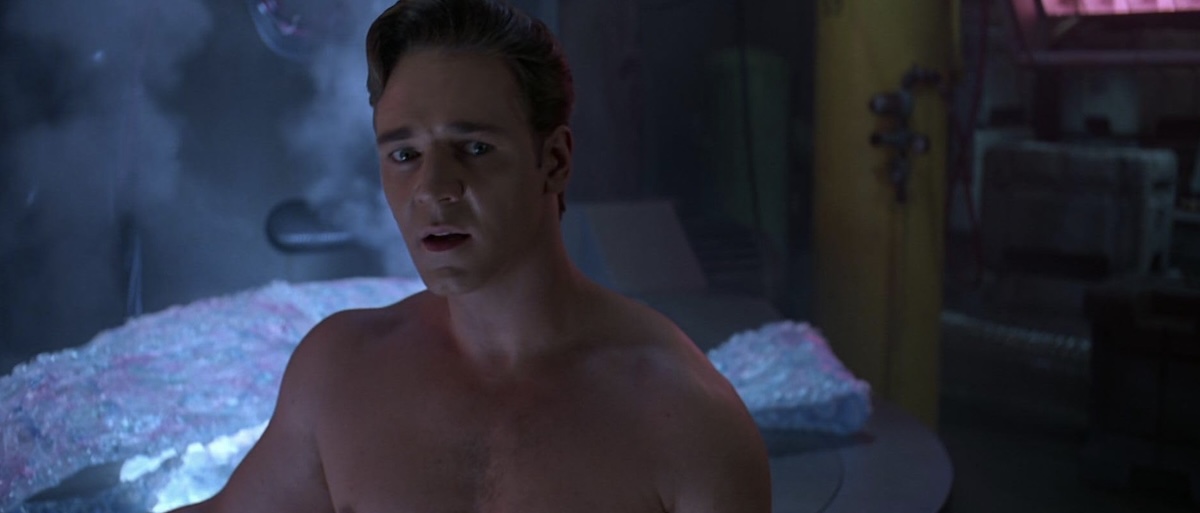
This thriller trend coincided with the exceedingly ephemeral futurism of 1990s science fiction. Concepts like a world wide web connecting humanity in a digital frontier were brought to startling faux reality with emerging CGI technology, and then promptly locked in their time by an over-reliance on age-old storytelling. Demolition Man (1993), Johnny Mnemonic (1995), Judge Dredd (1995), and Starship Troopers (1997) all reminded audiences that the more things change, the more they stay the same. Each film wrapped a glossy new paint job on classic pulp tropes ripped from 1950s B-movies. Sylvester Stallone went back-to-back with tough cops deemed necessary in either a utopia or a dystopia!
Virtuosity found Washington taking the hard-boiled detective trope into the far-flung future of 1999, where the criminal hails from cyberspace. Every review, both contemporary and retrospective, accedes that Denzel was sleepwalking through this one. He can sell the traditional machismo of a father avenging his family, but Lt. Parker Barnes (Washington) seems checked out, having to direct that anger at the amalgamation of 200 digital evil personalities uploaded into a robot that literally chews the scenery and steals every scene thanks to up-and-coming Australian actor Russell Crowe (Romper Stomper).
Still a relative unknown in Hollywood with The Quick and the Dead (1995) only six months before the release of Virtuosity, there’s one word to describe Crowe’s energy: hungry. He’d stand out in L.A. Confidential (1997), be Academy Award-nominated for ‘Best Actor’ in The Insider (1999), before finally winning an Oscar for Gladiator (2000). Five years prior, however, all he had was a chance in a frivolous sci-fi romp and this man was ready to stomp.
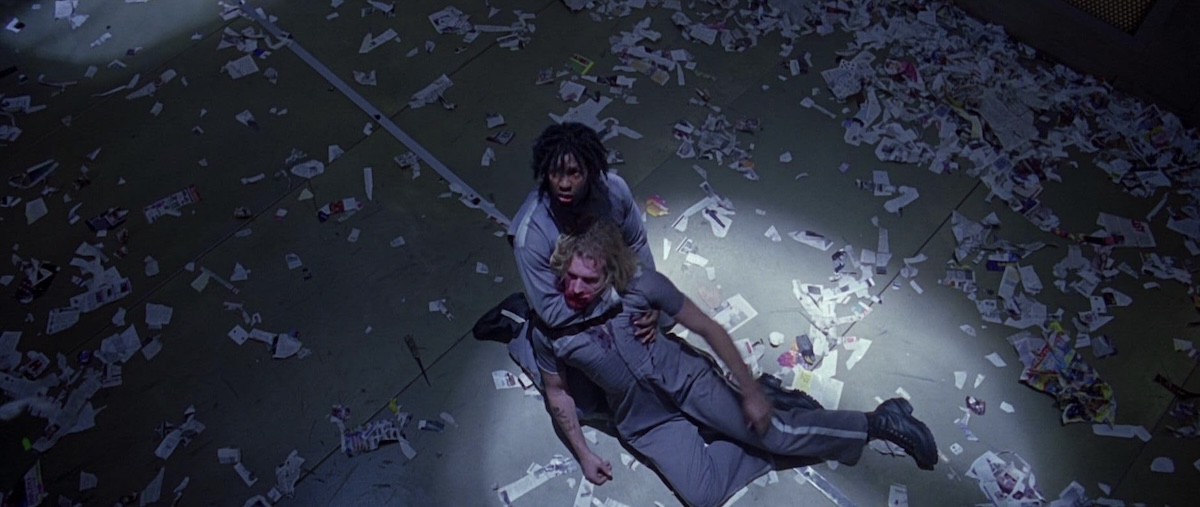
Sid 6.7 (an absurd acronym for Sadistic, Intelligent, Dangerous) is meant to be an e-cocktail of the worst killers in history, from Ted Bundy to Adolf Hitler, plus the man who killed Barnes’ family for bad luck. If my brief jaunts into true crime have taught me anything, it’s that most serial killers are a deceptively simple mix of misogynists and morons. Sid’s an equal opportunity tormentor, though still the peak blend of idiocy as he creatively names his televised death network… Death TV.
Crowe plays the role as a fusion of every iteration of The Joker, and amply leaps, somersaults, and backflips to make up for Denzel’s lack of enthusiasm. But his game-show host pantomime is more César Romero than Heath Ledger. As a robot, he’s less The Terminator and more Max Headroom.
An artificial intelligence with the purpose of testing law enforcement, he acts upon his newfound freedom in the real world (thanks to a nanomachine body) but never recognises he’s still following his programming. An intriguing preoccupation becomes his vanity. The electronic avatar, once on screen, discovers gravity, physics, flesh and blood… but is drawn back to seeing himself captured on camera. Venturing into a night club, he comes across a woman wielding a camera and catches his own face projected onto floor-to-ceiling screens. With a wicked smile, a revelatory Sid proclaims “I’m beautiful!”
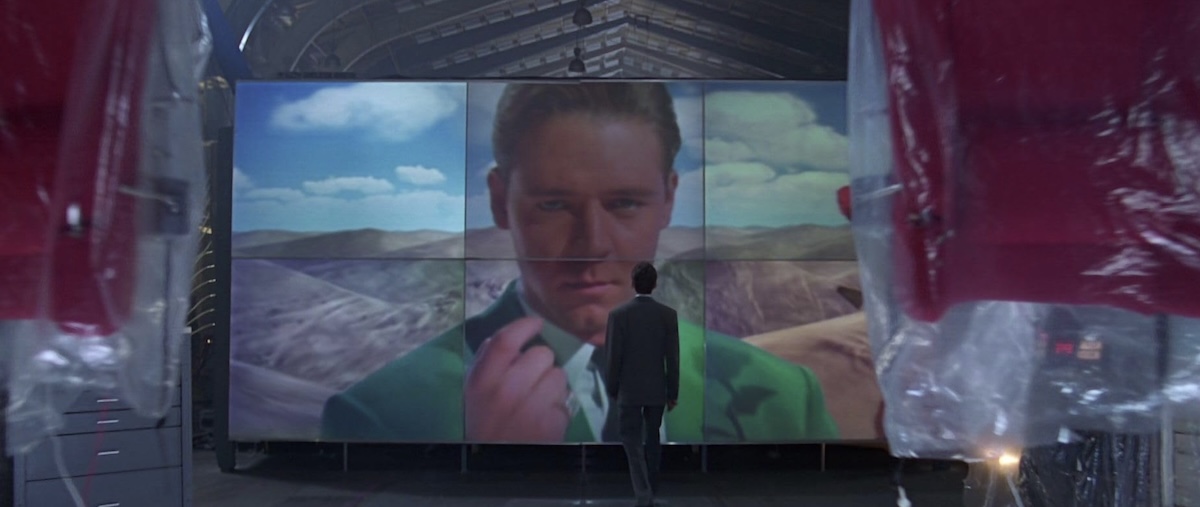
This fascination with your true self shared in such ‘objective’ fashion may resemble current influencer parasites, but this was very much a hot topic. To Die For (1995) featured a star-making turn for Nicole Kidman inspired by the first-ever televised trial. Everybody wants their fifteen minutes of fame, but commit a heinous enough crime and you become infamous forever. This mentality reaches back to Charles Manson, just one mind likely jumbled up inside Sid 6.7. After Sid takes over the night club, he forces the hostages at gunpoint to help compose his symphony of screams remixed on the music equipment. Pure camp, and unequivocally not a decent track in the slightest. Crowe is having the time of his life swinging his arms around like a demented Leonard Bernstein. The busy opportunist not only recorded a music video on set for his band 30 Odd Foot of Grunts between takes, but Sid 6.7 listens to Russell Crowe singing on the radio.
Written by Eric Bernt, whose only prior film credit was Surviving the Game (1994), the script provides enough lines for both the hero and villain to bark and bellow at each other to keep their cat-and-mouse bout exciting. He happenstance taps into modern truths like the elder Barnes teaching, “Colon parenthesis smiley face, people used to sign off their emails with that.” Virtuosity has such fun in its sci-fi playground, but for every two steps forward, it’s dragged one back by the quaint realisation of fictional science.
An A.I. born into a synthetic silicone-based body that rebuilds itself by absorbing glass is a neat idea. Being literally born out of an egg where Crowe shows off his cheeks and a glimpse of his hanging sack is hilarious. But look at a similar villain in Avengers: Age of Ultron (2015), where the titular villainous machine had dominion over the internet and an unstoppable hive-mind via a robotic army. The worldwide web in the mid-1990s isn’t so encompassing, and Sid’s often more vulnerable in the real world than he is in a computer simulation. Ironically, he comes off as trapped in a prison of his own making. These days, typing without thinking can make you the centre of attention instantaneously; Sid has to manually seize a broadcast studio sending out TV via phone lines. A.I. these days is benchmarked by the likes of Grok misidentifying the Jumping Man from Twin Peaks: Fire Walk with Me (1992) as Jim Carrey in The Mask (1994). Cutting-edge Sid 6.7 is outsmarted when people realise they can just cut his TV feed because he has as much control as any other man with a gun.
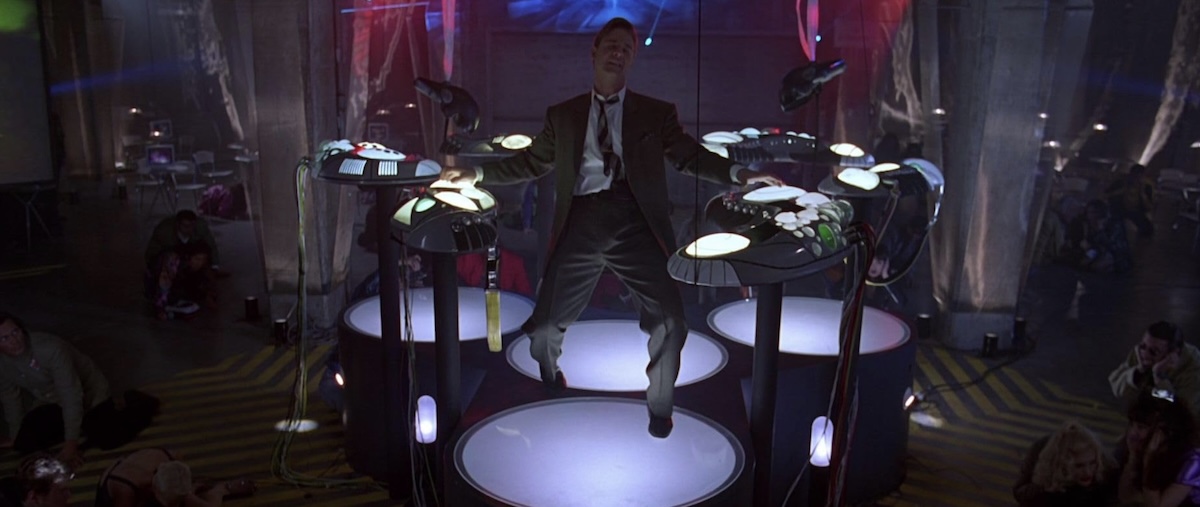
The hydra-like screenplay perseveres with several false finishes—each attempt to make Sid appear relentless but grinding the finale out to a flatline. Barnes fights him but fails to retrieve the location of a bomb, then the fight starts again and this time Barnes is killed. A clever, if transparently foreshadowed, rematch in VR makes the most of the science in this fiction. With Sid trapped back in VR, Virtuosity should’ve ended there. Instead, the film drags us right back to the cliché of disarming the bomb. A last-minute sequence stretched out to almost ten minutes with zero tension. Why would a popcorn thrill ride end with Denzel Washington cutting the wrong wire?
These disappointing directions are due to director Brett Leonard. He helmed similarly batshit The Lawnmower Man (1992), in which Pierce Brosnan stuck a VR helmet on his intellectually stunted gardener Jeff Fahey, who duly became a genius cyber-god. That bizarre story made $150M. Even more astonishing was how far pioneer Leonard stretched his $10M budget to explore the nascent cyberspace realm entirely in VFX. Directing all-CGI music videos for Peter Gabriel and Billy Idol gave Leonard the experience to make a second movie, Hideaway starring Jeff Goldblum and heavy CGI, the same year as this. The tech wizard knows how to efficiently play with his new toys, but is the traditional directing as dependable as the story formulas in the screenplay?
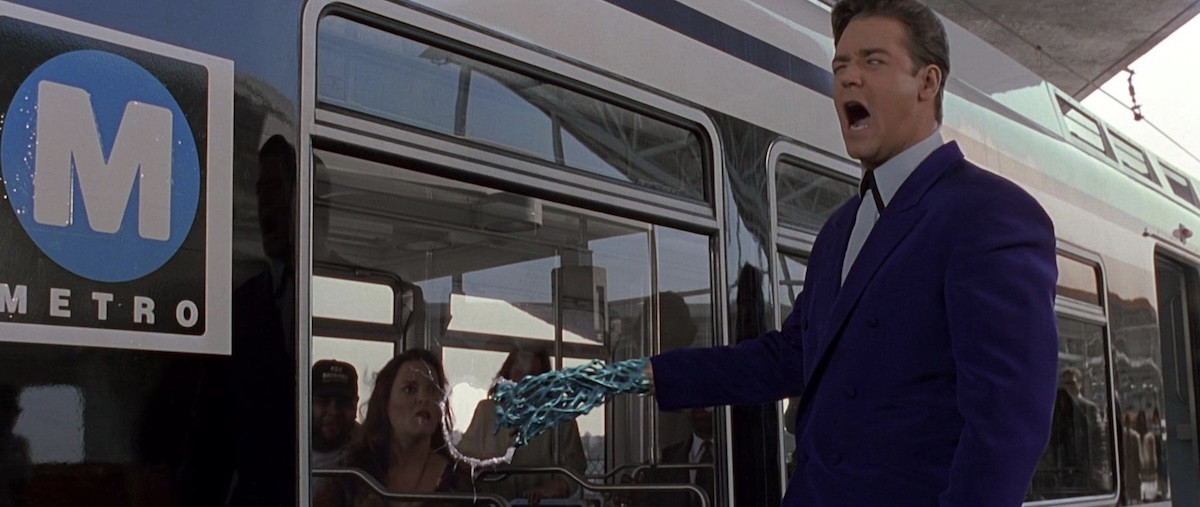
Leonard occasionally steers into stylish flares prescient of cyberpunk milestones like The Matrix (1999)—a virtual reality occupied by nondescript civilians all dressed in grey formal wear who fail to react to the astonishing action right beside them. He then dresses our hero in a garish bright blue rubber police uniform that even Denzel Washington fails to pull off. Virtuosity never presents the future as farcical in the same pointedness as Demolition Man, but it can be every bit as outlandish. Prisons replace bars with Chicago (2002)-style silhouette screens where the cell block tango still results in a non-stop torrent of torn newspapers raining down on Denzel. Inside the elite cop training VR, Barnes solemnly orders his partner to stay sharp for the hidden killer in a Japanese restaurant, and a zoot-suited Russell Crowe is the only white person in there.
Leonard is likely having a laugh as well. When supporting actor William Fichtner gasps “my god, he’s evolving!” there’s a smash cut to Crowe recreating the Saturday Night Fever (1977) street walk, complete with the Bee Gees. There are a handful of more current trends he succeeds in; the soundtrack is generous with Juno Reactor mixes who would find imminent success with The Matrix, and the Ultimate Fighting Championship (UFC) is presented as major television entertainment. The opening sequence may surmise the entirety of Virtuosity right at the beginning. Slick digitised credits set to the jazzy tune of Black Grape’s “A Big Day In The North” is superficially charming, but the blurred static establishing shot holds for several minutes and nothing is happening. Stylish but inert.
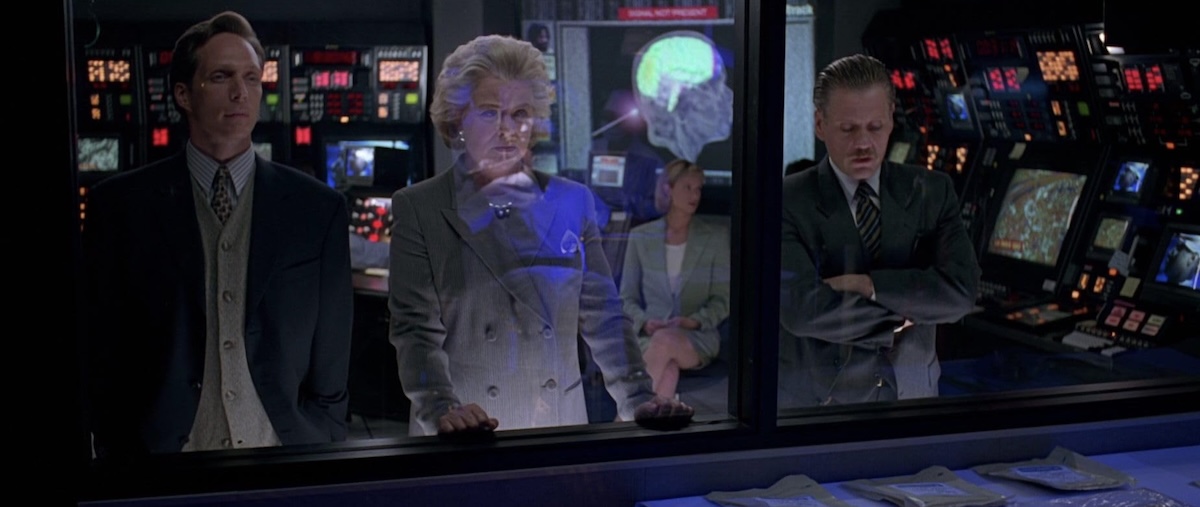
This criticism may be supported by a very revealing interview. There is scant production information on the Wikipedia page itself other than Denzel purportedly rewrote some of the film. This effort felt at odds with his performance, but it cited a 2012 AV Club interview with Kelly Lynch reminiscing over her acting career. Here she details an experience that absolutely floored me…
“First of all, the Denzel Washington part was a role that written for Mel Gibson, and it was a romantic role. He played a character who was in prison for many years, and he gets out and hooks up with this computer forensic specialist who finds bad guys on the Internet, and they pursue this guy who’s a virtual-reality kind of creation. And Denzel decided… Well, we all had to audition with him, which they rarely do anymore. It was really sexual, funny, we connected intellectually… Everything was working. They were thrilled. And it was a wonderful script. But when we showed up for rehearsal, Denzel… [Hesitates.]
We had kind of an inexperienced director, who I think had only done a few movies before that and really didn’t have much experience with big movie stars. And when actors feel like there’s not a real captain of a ship, they can feel like, “I have to take this project under my wing, and I have to fix it, because no one is minding the store.” That’s the kind of feeling Denzel had, I think, so he took the script and rewrote it and decided that my character wasn’t really so much of an expert but worked at a company and had a child, who would have a bomb strapped to her back. So I would be some sort of a hostage, a child-in-jeopardy thing—which I absolutely hate—and there would not be a romantic relationship between these people. Even though this man had been in prison for many, many years, he didn’t feel any connection to women when he got out… or at least not any woman that we see him with. And then he took half of my part and incorporated it into his dialogue. That was kind of the beginning of the end. I mean, the whole script just unraveled.
I was very nice, though. I said, “Denzel, what is it? Why don’t you believe that the man you’re playing couldn’t be attracted to me?” I mean, it wasn’t a cheesy love story. It was actually really well-written and moving. And he said, “You know what, Kelly? I hate to say it, but, you know, white men bring women to movies, and they don’t want to watch a black man with their woman.” I was like, “What? No. Really?” He said, “No, I’m sorry, but that’s truly what it is. That’s what the audience is.” I’m like, “But how about The Bodyguard? That was a huge hit movie.” “Well, that’s different. That’s a white man. It’s different.” I said, “So that’s your main motivating factor on this?” He said, “Yes.”
I watched Russell Crowe, who’s a brilliant actor as well, and he made something out of that movie, which was a complete mess. He took it and he found his place, because he wasn’t involved in any of that weird black/white dynamic. There were all these things that I didn’t understand were happening or were allowed to happen, and not everybody was happy with those choices that Denzel had made, but no one stopped him.”
This may be more entertaining than the film itself. Virtuosity deserves at least one watch as passable entertainment, and warrants a rewatch as a glimpse into the mind of a superstar working on another level. It didn’t pass muster at the box office, grossing a staggeringly low $37M against a $30M production budget. Reviews were as mixed as Lawnmower Man and Hideaway (1995), and Leonard found his career didn’t have a bright future following these failures. But Crowe’s been slipping back similarly deranged roles recently, like Unhinged (2020) and The Pope’s Exorcist (2023). Maybe the far future of 2029 is the perfect time for a 70-year-old Denzel Washington to discover his Facebook friend is actually a psychotic bot trying to steal his social security data.
USA | 1995 | 106 MINUTES | 2.39:1 | COLOUR | ENGLISH

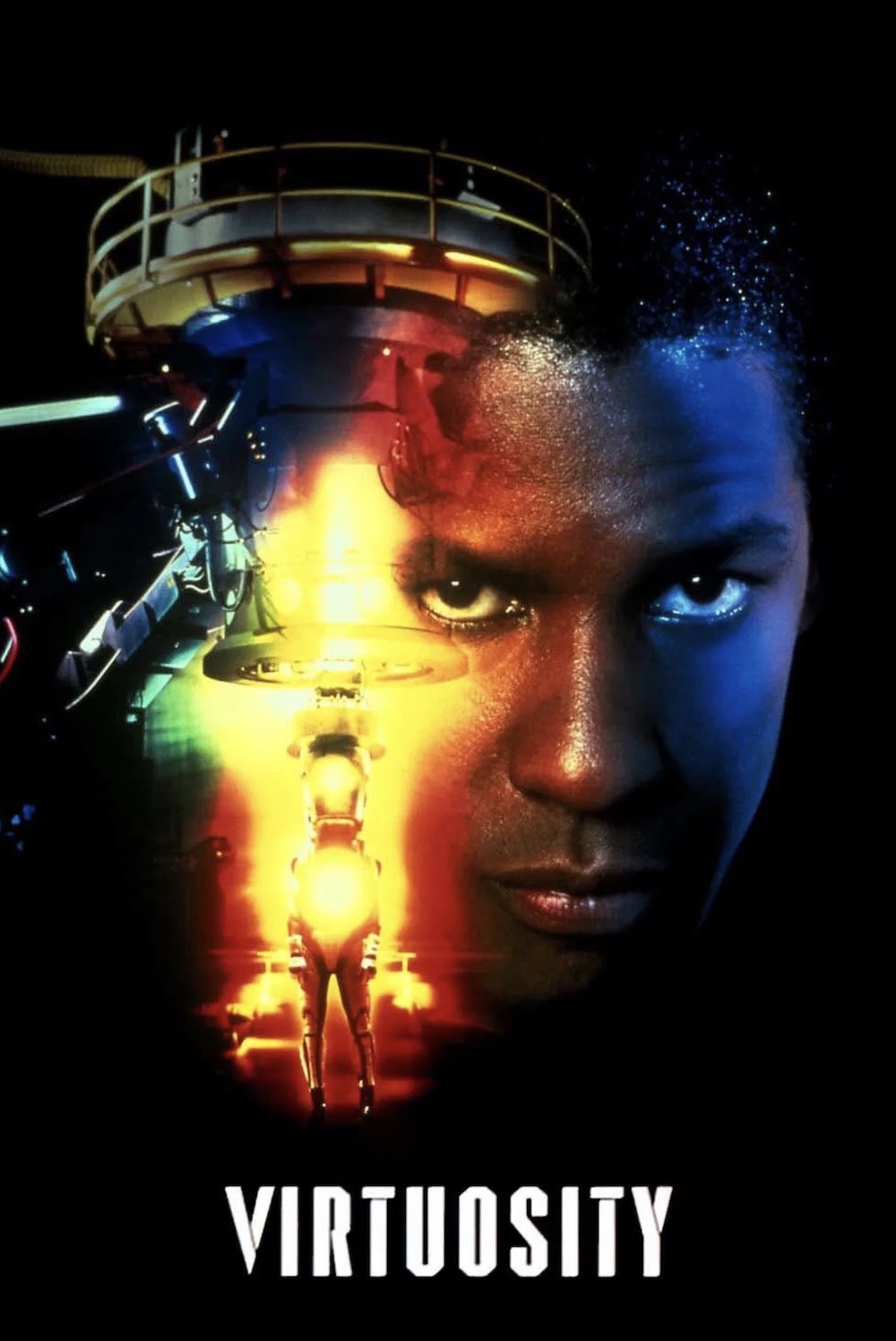
director: Brett Leonard.
writer: Eric Bernt.
starring: Denzel Washington, Russell Crowe, Kelly Lynch, Stephen Spinella, William Forsythe, Louise Fletcher, William Fichtner & Kaley Cuoco.
